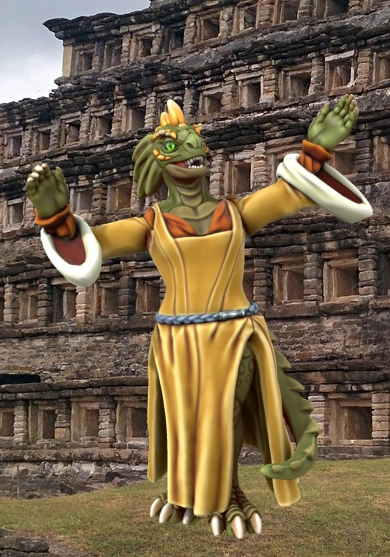The Past Singer
Asssakh Khasssah's Life
What's in a Name?
The Taxlatl language is complex, and while it does not rely upon syllabic stress as do many of the other languages of the Folk, it does rely heavily on the degree to which certain phonemes are "extended" to imply particular meaning.The Taxlatl word khasah is usually translated as "one who sings", or "one who is singing". But by extending the middle "s" sound, one changes the meaning from "anyone who is singing" to "one whose profession - whose calling in life - is to sing". So a khassah is a bardic performer of some sort.
The Taxlatl word for "something in the past" is asakh. With this minimal "s" sound, the word is adjectival: as in "a past event". Extending the "s" sound changes the word, though to a noun which means "the Past", or "the collective period of time which came before now". When combined with the word for performer, we get assakh khassah: one whose purpose in life is to sing of the Past. In Commonspeech, these are the Past Singers - bards who recall tales of past Taxlatl greatness. To one fluent in Taxlatl, this is a far cry from asakh khasah, which is simply somebody who sang something once or twice a while ago.
This brings us to our bard, Asssakh Khasssah. To any fluent speaker of Taxlatl, the meaning is unmistakeable: this is the name of the greatest Past Singer that ever was. A Past Singer of remarkable musical talent, whose knowledge of the ancient lore and history of the Taxlatl was unsurpassed. None since her have gone by that name; she was and still is THE Past Singer... the greatest that ever was.
Early Life
It is presumed that as a youngling, she demonstrated musical aptitude and the ability to remember the songs and tales she was taught. It is these skills that catch the eye of Past Singers who are seeking to train their replacements; something that every Past Singer strives to do in order to ensure the preservation of all the lore of the Taxlatl.
Ancestry
TaxlatlAge at Death
Uncertain. About 215 years old according to the tales. (This is about three times the life expectancy of a typical Taxlatl, but Past Singers have been known to be exceptionally long-lived.)Place of Birth
Taxl gra Kalakhrassa in what is now the Coldmarsh FensDuring her time a student, Asssakh Khasssah had the opportunity to absorb practically all of the tales of Taxlatl achievements and greatness. She learned of the rise and fall of their First Civilization, which was brought down by disease after first contacts with the Humans who had recently been Awakened in the world. She learned tales of overcoming the hardships that followed the fall, and tales of the gradual restoration of Taxlatl technology, mastery of the arcane, and culture until the Second Civilization was greater than its predecessor.
The Great Strife and the Fall of the Taxlatl
Asssach Khasssah is believed to have been about thirty years old when the Great Strife erupted out of the heavens to engulf the entire world of Cartyrion. She was still officially a student - and would be as long as her mentor lived - but she had already surpassed her mentor in skill, particularly because she was an accomplished Crest Singer while he was not. She could sing from memory all of the Tales that were known in the city that was the seat of the Second Civilization, and her audiences were enraptured when she did so.When the God-War came, Tasakhee Sashta, who had no love and little respect for Humans and Elves, urged the king to fight on the side of the Dark Gods. Asssakh Khasssah disagreed, and after a falling out with her mentor and the king, she was forced to flee into the wild lands beyond the great Taxlatl cities. She spent the next hundred or so years among small bands of like-minded refugees, singing the songs and telling the tales to inspire them to persevere. It is said that truly gifted Past Singers can draw upon the magics of the world to keep themselves invigorated; this certainly seems to be the case with Asssakh Khasssah, for when the god-war ended, she was still alive and thriving, despite being at least twice as old as most Taxlatl could ever hope to be.
The Past Singer of Taxl gra Akhrassa
She found herself living among a small band of refugees who had fled Taxl gra Kalakhrassa as it was being shattered, and it was she that led them back into the ruins of the city once the Great Strife ended. She had learned the tales of hardship that followed the fall of the First Civilization, and she used these to inspire the survivors to remember their heritage. Almost nightly, she would be found sitting around a campfire with some of the survivors, singing and telling the tales of how the Taxlatl rose again after their first fall. Her inspiration kept despair from defeating the last of the Taxlatl.
The refugees renamed their settlement Taxl gra Akhrassa, which means City of the Swamp in their tongue, to reflect the fact that the once rich and fertile grasslands that surrounded the area were now a sunken, fetid marshland as far as the eye could see. They knew it would be a long time before their people would recover, but thanks to Asssakh Khasssah, they never abandoned hope.
Crest Singing
Asssakh Khasssah was one of these gifted few. It is told that she could create and modulate clean, crisp tones pleasant to even a non-Taxlatl ear. She could even accompany herself when she vocalized one of the many tales of the Taxlatl. Only a handful of Taxlatl throughout all of history have ever been able to master that ability.
Asssakh Khasssah's Journeys
Over the years, she undertook more of these journeys, extending farther and farther from what was the center of her civilization. For a long time, though, she found nothing but decay and devastation. But after several years, she finally came across a small group of lizardfolk eking out a living at the rocky edge of the sea.
She discovered that these Folk were all that was left of what had been a
Asssakh Khasssah was shocked to discover that these children knew very few of the tales taught to all younglings of the people. The elders remembered them rather poorly, if they could remember them at all.
She felt that these were Taxlatl who were being raised in ignorance of their true heritage and potential, and for a simple reason: the settlement did not have a Past Singer!
Asssakh Khasssah stayed with these folk for two months, singing the tales of Taxlatl past greatness to inspire
When she finally left the settlement with her new student, she did not return home. Rather, she journeyed for three more years, reaching further and further from home in her search for other settlements of the Taxlatl. She found several, and in all but one she found them also lacking a Past Singer. She finally returned home with six pupils in tow.
The Past Singer of All the World
And so, at the Past Singer's direction, scouts were sent to scour the entire world for pockets of Taxlatl folk who had survived the Great Strife, but were in danger of forgetting their heritage. These scouts were trained to recognize the
Asssach Khasssah chose these scouts for their dedication to the cause of Taxlatl Civilization, but also for their memory, musical and story-telling abilities. Each was carefully taught one song - the Song of the Makers - considered to be the most inspiring of all tales in the Past Singers' repertoire. The scouts would use it to remind any they found of the Taxlatl greatness and potential, and kindle in them the desire to obtain a Past Singer of their own.
Asssakh Khasssah's Legacy
Asssakh Khasssah summed up her life work in what have been passed down as the last words she sang before death: the world would one day again know the greatness of the Taxlatl.
The Death Song
One of the things taught to each Past Singer is that they should chronicle their own life and pass that chronicle along to the one who replaces them when they can no longer perform their duties. Since most Past Singers don't pass the mantle until they're about to die, these chronicles have come to be called the Death Songs of the Past Singers.Far from dirges or laments, Death Songs are written to be inspirational. They are always sung by the new Past Singer at the funeral/memorial service held for the deceased Past Singer. But sometimes a Past Singer will perform it themself as a last official act. The tales say that Asssakh Khasssah had her death-bed carried out to the central plaza of Taxl gra Akhrassa so she could sing hers to all the people of the city, and that she expired as the last words and notes sounded around the square.
Battle maps prepared using DungeonFog
(with many map assets courtesy of Caeora)
Artwork designated as being from Pixabay is governed by
Pixabay License
copyright© 2020, 2021, 2022, 2023, 2024, 2025 Robert O'Brien
Game Rules described herein are governed by
Open Game License version 1.0a
Descriptions of the World of Cartyrion, including, but not limited to its cosmology, deities, geography, political structures, religious sects, regional names, villages, towns, cities, and characters, are governed by Non-Commercial, Share-alike Creative Commonse License









Wonderfull article Bob! I like the part about the language with the s, ss and sss differences. But also how she basically saved their whole culture is awesome.
Thanks for taking the time to comment. It's always greatly appreciated. Yeah... this article turned into a Conlang exercise in addition to a bard building exercise, but it was fun (and needed for my lore).
The Perseus Arm - A new, alternative setting for fans of Traveller in any of its variations.
Laurels & Loot is a new, lightweight TTRPG rules system that hearkens back to the early days.